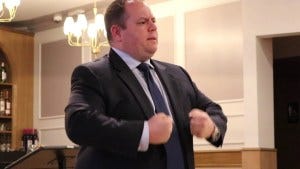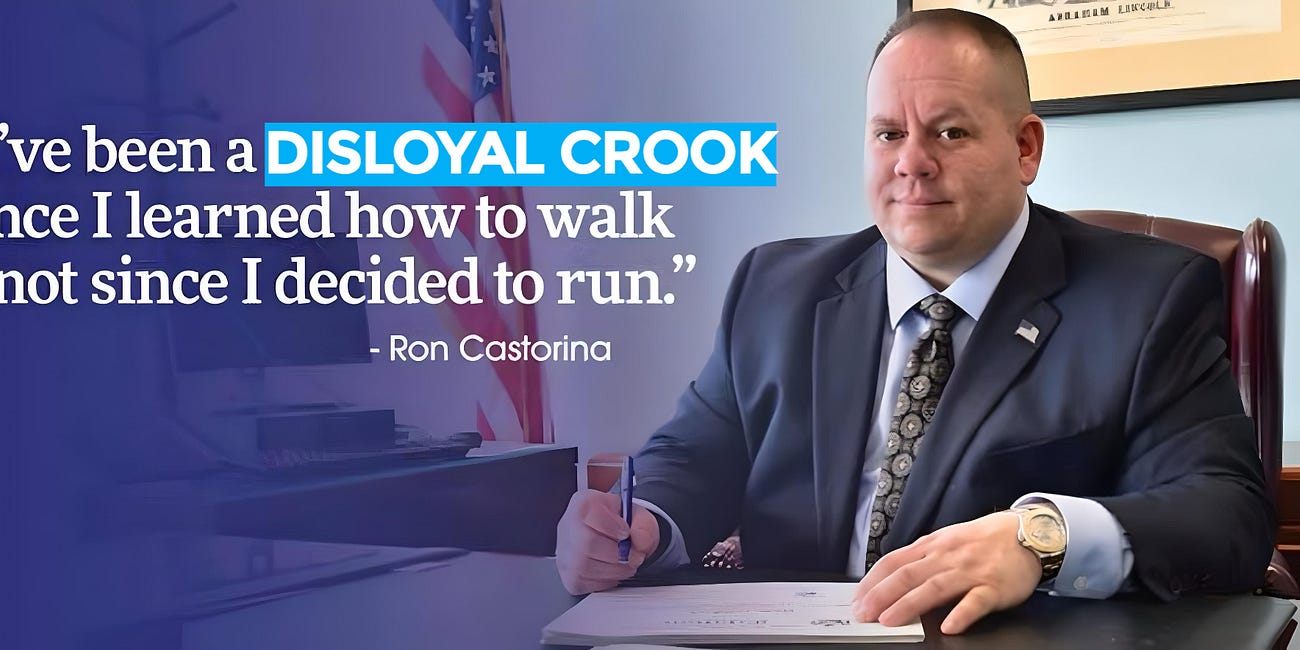Scandalous Revelations: Luthmann Points Fingers at Eric Nelson for Prison Horrors
Claims Prison Torture, Rape & PTSD in Plea Withdrawal Petition Challenging 'Fake Facebook' Conviction
NOTE: This story appears on Frank Report (www.frankreport.com) along with additional coverage of Luthmann’s shocking prison rape and torture allegations.
By Frank Parlato
Richard A. Luthmann, a former New York lawyer, has initiated legal proceedings to overturn his 2020 state conviction in what has become known as the ‘fake Facebook case.’
The case involved Luthmann creating false Facebook pages for several political candidates, including Staten Island District Attorney Michael Edward McMahon and former Republican Assembly candidate Janine Materna.
Despite Luthmann’s insistence that the Facebook pages were satirical and clearly labeled ‘unofficial,’ Special Prosecutor Eric Nelson charged him with identity theft and fraud. Nelson argued Luthmann created these pages to influence elections and damage the reputations of Materna and McMahon.

Calls for Disciplinary Action Against Prosecutor
Luthmann seeks to withdraw his plea, vacate the judgment, dismiss the case with prejudice, and instigate disciplinary action against Special District Attorney Eric Nelson. The issue is before Acting New York State Supreme Court Justice Donald Leo.
Corrupt Special Prosecutor Nelson Concedes Luthmann's Fake Facebook Conviction is Going Away
By Richard Luthmann Eric Nelson is an “incompetent by design” Staten Island special prosecutor. Eric Nelson is also a stone-cold criminal. I will present the facts, you decide. Committing, Overlooking Crimes to “Get Luthmann” In Russell v. United States
Luthmann also requests Justice Leo to refer Nelson, Perry Reich (a disbarred legal advisor to Nelson), and Ronald Castorina Jr., a former Assemblyman and current New York State Supreme Court Justice, to law enforcement for alleged crimes committed during the prosecution of him.
In addition to his state case, Luthmann faced federal charges for a scrap metal scheme involving one of his legal clients. He pleaded guilty to multiple federal charges, including wire fraud, money laundering, and extortion, and was sentenced to four years in prison in 2019.
Upon his release, Luthmann, who remains on probation until March 27, 2024, began a new career as a journalist and started the process to challenge his state conviction. In his filings, Luthmann claimed he was not mentally fit to agree to a plea, which he made via video on October 27, 2020, from LSCI Allenwood, a federal prison in White Deer, Pennsylvania.

SHU Torture, PTSD, and Prison Rape
Luthmann argued his plea was not voluntary and was influenced by threats, misrepresentations, or unwarranted promises.
He blames Nelson for his situation: “I still fear what he may do under the ‘color’ of law enforcement. I blame him on the same level as a physical abuser.”
In his filings, Luthmann revealed that before he took his plea, he spent nearly two months in the Special Housing Unit (SHU), an experience he described as torture.
Now, under the care of Dr. Juan Quiros from Florida Personal Management, Luthmann told the court that he has a diagnosis of Post-Traumatic Stress Disorder (PTSD), a condition he attributes partly to his time in the SHU.
This lengthy period of isolation, which he claims was based on unfounded charges related to possessing a cell phone, contributed significantly to his mental health issues.
Luthmann also disclosed he was a victim of multiple rapes in prison, incidents that occurred right after his release from the SHU, and his reintegration into the general housing unit in September and October 2020.
“I am uncomfortable talking about these experiences, which form a critical aspect of my mental health treatment. Reliving these moments is painful, but I am in the process of healing,” Luthmann said.
He elaborated on his experiences’ psychological impact, stating, “The anguish of enduring prison rape is on the same magnitude as the torture I faced in the SHU.”
Intimidating Plea Hearing
He admitted he focused on avoiding the mental torment of the SHU at the time of the alleged plea.
“When trapped in a victim mentality, one may prefer the brief yet excruciating physical pain of rape, knowing it would soon end, over the enduring mental torment of the SHU, which felt endless,” Luthmann said. “That was my mindset around the time of the alleged plea. My primary goal was to evade the mental torment of the SHU, whatever the cost. I’ve always prioritized my mental well-being over physical pain.”
On the day of his video plea hearing, Luthmann was escorted from his unit to a different section of the prison by a group of unit officers, correctional officers, and other staff members, some of whom he recognized from his time in the SHU. The officers expressed displeasure about being there for “Luthmann’s bullshit.”
Complaints ranged from a general disdain for the inconvenience of video proceedings to personal grievances, like an officer grumbling about possibly missing his post-shift golf game.
With a vicious smile, one officer remarked how “nice” it was for Luthmann to be out of the SHU.
Luthmann recalls his anxiety:
“I was so eager for the hearing to end, to distance myself from these officers. Their palpable anger made it clear that the unfamiliar video procedure was an inconvenience. And in prison, inconveniencing the wrong people can lead to retaliation, which often meant a dreaded return to the SHU.”
With his focus solely on avoiding imminent threats at LSCI-Allenwood, he said he barely paid attention to the proceedings in a distant New York courtroom.
“The thought of returning to the SHU was a fate worse than death for me,” he said.
Plea under Duress
Despite the high-stakes nature of his case, the BOP declined to transfer him back to a federal prison in New York, a request he’d explicitly made.
He had no avenue to confer with his lawyers on the day of the plea. The absence of a “break-out” room in the video conference setup meant he could not speak privately with his attorneys, protected by attorney-client privilege.
With a backdrop of Luthmann’s PTSD, the looming shadow of the SHU, the intimidating presence of numerous officers, and their inflammatory remarks, the circumstances were dire. His recent experience in the SHU confinement, which the United Nations recognized as exceeding four times the threshold for permanent psychological injury, compounded his fragile mental state.
Being in a Pennsylvania federal prison while his case was in NYC further complicated matters.
In the lead-up to the plea, Luthmann detailed not having access to pivotal evidence, notably an email allegedly showing collusion between Nelson and Reich, the disbarred attorney. This email, Luthmann believes, revealed a plot to bypass any mention of the First Amendment to grand jurors, laying bare their motivations to indict him under questionable circumstances.
His New York attorney informed him that Nelson’s reactions became volatile after encountering the Interstate Agreement on Detainers Act [IADA] paperwork. Romano allegedly relayed to Luthmann that Nelson asserted he had instructions to “get” Luthmann from higher-ups.
He disputed that his former training as a lawyer gave him any advantages or insights in the prison environment. Luthmann stressed that PTSD’s debilitating effects rendered his prior profession and knowledge irrelevant, making every decision a matter of survival.
The pandemic heightened Luthmann’s distress since he had diabetes, and contracting COVID-19 could be fatal.
Concerns of Retaliation; Legal Manipulation
Luthmann contends he couldn’t make a fully informed and competent waiver of his rights due to his mental state and hostile circumstances.
But now he is going forward, he says, with concern for the potential fallout from his revelations.
“I fear retaliation for my truthful testimony,” Luthmann said. “I would rather kill myself than return to prison for a supervised release violation,” emphasizing the depth of his fears of returning to the treacherous confines of prison.
Luthmann’s apprehensions don’t just stem from past trauma. He believes Special Prosecutor Nelson, whom he characterizes as a “stone-cold criminal,” will manipulate his under-oath statement in his court filings to create further complications with his federal overseers.

Finds Strength Amidst Struggle: Blames Nelson for Traumas
Yet, Luthmann projects resilience in the face of these challenges: “I am no longer afraid. I have become a warrior,” partly due to the manipulations of Special Prosecutor Nelson and the political machinery he believes is behind him. He draws strength from biblical references, quoting Luke 12:35, “Let your loins be girded about, and your lights burning,” signaling his readiness for unexpected challenges.
Luthmann alleges abuses he endured stem from the actions spearheaded by Special Prosecutor Nelson. He believes that had Nelson not layered the false New York State case on top of the federal one, he would not have faced heightened custody levels that barred him from being placed in a prison camp tailored for non-violent, white-collar offenders. Instead, his trajectory led him to places where he experienced deep trauma and sexual abuse.
“I don’t blame my prison rapists,” Luthmann stated. “I blame Eric Nelson and his co-conspirators.”




I posted this on Frank Report:
The legal argument is laser focused on the deficiency of the voluntary, knowing, and intelligent nature of the plea proceedings. There is a plethora of case law that says this was an illegal plea AND no caselaw that says the procedures Eric Nelson employed were legal and valid – from taking the plea via video without a waiver, to failing to return me to New York for the plea, to consulting with the disbarred Perry Reich during critical points in the proceedings as the advisor to “THE PEOPLE OF THE STATE OF NEW YORK” in violation of the law, RPC 3.8, and Appellate Division Orders and Rules. This case is not like others. The torture and rape are ADDITIONAL to the technical defects and show my inability to properly from a knowing, voluntary, and intelligent state of mind in combination with all the other factors.
Also, prosecutors can’t be in the business of committing felonies in order to secure indictments and convictions, and that’s just what Eric Nelson did.
The legal is only one part of it, though. As you recognize, there is a psychological aspect.
I have been reading Victor Frankl and other helpful books trying to process the PTSD. In prison, I had a list of nine people I resolved to end. One of them is dead already from a pill/drug overdose. I chose nine because that was the proper number the Vikings sacrificed when they did their thing – nine of every kind. There was no mental health services to speak of in prison, and they threw me to torture in the SHU, which only made things worse. You don’t think you can become more obsessive. But in the SHU – often solitary confinement – the limits of your crazy are the depths of your imagination and tortured mind.
Now that I’ve had some therapy and I am beginning to process things, I realize that my anger and desire to see the remaining eight die will probably never go away. It’s a natural human emotion, to want revenge. And mine is more than justified. But, using Frankl’s methodology, I cannot use overt physical violence and must use appropriate channels to achieve my vindication, like the courts and the media. I have to “exhaust all remedies” before any consideration is made on whether to unleash the inner Viking Berserker, my inner William Wallace.
So, as part of my therapy, I have come to see the value in using “their system,” where I expect corruption, before using another system. It’s also part of the New Testament. I have to reject their acts and give forgiveness, particularly if they recognize they have done wrong.
Nelson doesn’t think he’s done wrong, so I might be stuck in the Old Testament dealing with him. Ezekiel 10-11: “Then they shall know that I the LORD did not threaten in vain to inflict this evil on them. Thus says the Lord GOD: Clap your hands, stamp your feet, and cry “Alas!” for all the evil abominations of the house of Israel! They shall fall by the sword, starvation, and disease.”
The hope is that the PTSD therapy will progress to the point where I can be ok with things. I can come to some sort of higher meaning, like Victor Frankl. But it’s a tough habit to break when for every day for four years a list of certain people were all you thought about from the time you woke up in the morning until the instant you fell asleep, and often times you dream about them. Sometimes, I still do. I’m not sure if that’s healthy, or part of processing, but it’s there.
My doctors tell me that the pain is healing is just as bad as the original trauma, sometimes worse. It’s like re-breaking and re-setting a bone that healed improperly.
But at this point I take solace in knowing I’ll outlive every one of these bastards, and they all know they’ve done wrong. It’s like in Braveheart, after they double-crossed William Wallace, none of them slept a good night’s sleep ever again. They knew a Scotsman mad with fury and fire was after them and their children, and their children’s children.
https://youtu.be/1KdjUNIcP8k